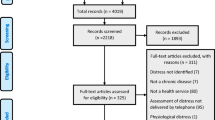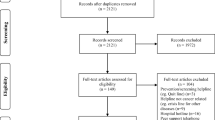Abstract
Purpose
The purpose of this study is to determine how people diagnosed with cancer who call the Cancer Council Helpline in South Australia differ from carers/family/friends (caregivers) who call.
Method
Descriptive, retrospective audit of calls from people who contacted Cancer Council Helpline in South Australia between 16 April 2009 and 16 April 2013 who were diagnosed with cancer (n = 5766) or were the caregivers (n = 5174) of a person with cancer.
Results
Caregivers were more likely to be female (p < 0.001); younger in age (p < 0.001); call regarding cancer that was metastasised/widespread/advanced, terminal or at an unknown stage (p < 0.001) and phone requesting general cancer information or emotional support (p < 0.001). This group was more distressed (p < 0.001) but less likely (p = 0.02) to be offered and/or accept referrals to counselling than people diagnosed with cancer who called. Follow-up care was required by 63.5 % of caregivers and 73.1 % of people with cancer according to distress management guidelines; 8.5 and 15.3 %, respectively, accepted referrals to internal services. The most frequently discussed topic for both groups was emotional/psychological concerns. There were no differences in remoteness of residence or call length between groups.
Conclusions
Caregivers represented different demographic groups than people diagnosed with cancer who called this helpline. The two groups phoned for different issues, at different stages of disease progression, displayed different levels of distress and, therefore, may benefit from services being tailored to meet their unique needs. These results also demonstrate the capacity of helplines to complement other health services and confirm that callers to cancer helplines exhibit high levels of distress.
Similar content being viewed by others
References
Australian Bureau of Statistics (2014) Regional population growth, Australia, 2012–13. http://www.abs.gov.au/ausstats/abs@.nsf/Products/3218.0∼2012-13∼Main+Features∼Main+Features?OpenDocument#PARALINK3. Accessed 21 November 2014
Australian Institute of Health and Welfare (2004) Rural, regional and remote health: a guide to remoteness classifications. Rural Health Series, Canberra
Boltong A, Byrnes M, McKiernan S, Quin N, Chapman K (2015) Exploring the preferences, perceptions and satisfaction of people seeking cancer information and support: implications for the cancer council helpline. Aust J Cancer Nurs 16:20–28
Chambers SK, Girgis A, Occhipinti S, Hutchison S, Turner J, Morris B, Dunn J (2012) Psychological distress and unmet supportive care needs in cancer patients and carers who contact cancer helplines. Eur J Cancer Care 21:213–223
Doarn CR (2015) Cost Efficiencies in the Healthcare Setting: Telephone Versus Face-to-Face. EBioMedicine 2:1032–1033
Glajchen M (2003) The emerging role and needs of family caregivers in cancer care. J Support Oncol 2:145–155
Golant M, Haskins NV (2008) “Other cancer survivors”: the impact on family and caregivers. Cancer J 14:420–424
Hardyman R, Hardy P, Brodie J, Stephens R (2005) It’s good to talk: comparison of a telephone helpline and website for cancer information. Patient Educ Couns 57:315–320
Hawkes AL, Hughes KL, Hutchison SD, Chambers SK (2010) Feasibility of brief psychological distress screening by a community-based telephone helpline for cancer patients and carers. BMC Cancer 10. doi:10.1186/1471-2407-10-14
Hsieh HF, Shannon SE (2005) Three approaches to qualitative content analysis. Qual Health Res 15:1277–1288
Hutchison SD, Sargeant H, Morris BA, Hawkes AL, Clutton S, Chambers SK (2011) A community-based approach to cancer counselling for patients and carers: a preliminary study. Psycho-Oncol 20:897–901
Hutchison SD, Steginga SK, Dunn J (2006) The tiered model of psychosocial intervention in cancer: a community based approach. Psycho-Oncol 15:541–546
Jefford M, Black C, Grogan S, Yeoman G, White V, Akkerman D (2005) Information and support needs of callers to the Cancer Helpline, the Cancer Council Victoria. Eur J Cancer Care 14:113–123
Jefford M, Kirke B, Grogan S, Yeoman G, Boyes A (2005) Australia’s cancer helpline: an audit of utility and caller profile. Aust Fam Physician 34:393
Leahy M, Krishnasamy M, Herschtal A, Bressel M, Dryden T, Tai KH, Foroudi F (2013) Satisfaction with nurse-led telephone follow up for low to intermediate risk prostate cancer patients treated with radical radiotherapy. A comparative study. Eur J Onc Nurs 17:162–169. doi:10.1016/j.ejon.2012.04.003
Lin W-L, Sun J-L, Chang S-C, Wu P-H, Tsai T-C, Huang W-T, Tsao C-J (2013) Development and application of telephone counseling services for care of patients with colorectal cancer. APJCP 15:969–973
Marcus AC, Garrett KM, Kulchak-Rahm A, Barnes D, Dortch W, Juno S (2002) Telephone counseling in psychosocial oncology: a report from the Cancer Information And Counseling Line. Patient Educ Couns 46:267–275
National Comprehensive Cancer Network (2011) Distress management. National Comprehensive Cancer Network, Washington
Papastavrou E, Charalambous A, Tsangari H (2009) Exploring the other side of cancer care: the informal caregiver. Eur J Onc Nurs 13:128–136
Psycho-oncology Cooperative Research Group (2012) ARIA lookup tool user guide. School of Psychology, The University of Sydney, Sydney
Reid J, Porter S (2011) Utility, caller, and patient profile of a novel chemotherapy telephone helpline service within a regional cancer centre in Northern Ireland. Cancer Nurs 34:E27–E32
Reubsaet A, Lechner L, Vries HD (2006) The Dutch cancer information helpline: more critical patients after 10 years. Patient Educ Couns 63:215–222
Rhee YS, Yun YH, Park S, Shin DO, Lee KM, Yoo HJ, Kim JH, Kim SO, Lee R, Lee YO (2008) Depression in family caregivers of cancer patients: the feeling of burden as a predictor of depression. J Clin Oncol 26:5890–5895
Sardell S, Sharpe G, Ashley S, Guerrero D, Brada M (2000) Evaluation of a nurse-led telephone clinic in the follow-up of patients with malignant glioma. Clin Oncol 12:36–41
Shaw J, Young J, Butow P, Chambers S, O’Brien L, Solomon M (2013) Delivery of telephone-based supportive care to people with cancer: an analysis of cancer helpline operator and cancer nurse communication. Patient Educ Couns 93:444–450
Tamayo GJ, Broxson A, Munsell M, Cohen MZ (2010) Caring for the caregiver. Oncol Nurs Forum 37:E50–E57. doi:10.1188/10.ONF.E50-E57
van Ryn M, Sanders S, Kahn K, van Houtven C, Griffin JM, Martin M, Atienza AA, Phelan S, Finstad D, Rowland J (2011) Objective burden, resources, and other stressors among informal cancer caregivers: a hidden quality issue? Psycho Oncol 20:44–52
Watts KJ, Good LH, McKiernan S, Miller L, O’Connor M, Kane R, Kruger DJ, Adams BR, Musiello T (2015) “Undressing” distress among cancer patients living in urban, regional, and remote locations in Western Australia. Support Care Cancer. doi:10.1007/s00520-015-2982-4
Acknowledgments
The authors wish to acknowledge the effort of Cancer Council SA nurse counsellors in collecting the data, Pam Adelson for reviewing early drafts and providing statistical advice and Dr Mohammadreza Mohebbi for his assistance with the data analysis.
Author information
Authors and Affiliations
Corresponding author
Ethics declarations
Funding
None.
Conflict of interest
The authors declare that they have no competing interests.
Rights and permissions
About this article
Cite this article
Fennell, K.M., Heckel, L., Wilson, C. et al. How calls from carers, friends and family members of someone affected by cancer differ from those made by people diagnosed with cancer; analysis of 4 years of South Australian Cancer Council Helpline data. Support Care Cancer 24, 2611–2618 (2016). https://doi.org/10.1007/s00520-015-3069-y
Received:
Accepted:
Published:
Issue Date:
DOI: https://doi.org/10.1007/s00520-015-3069-y




